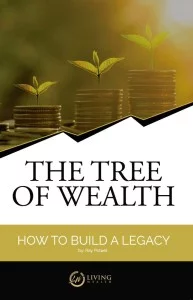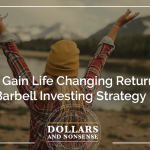In this episode, we will discuss the process of evaluating a financial strategy and determining if it is too good to be true. We’ll share some tips and thoughts so that you don’t get swindled by the next fly by night salesman.
We’re in the type of financial business where we’re privy to hear people say, “Wow! This sounds so good it might be too good to be true.”
And I know you’ve heard it many times talking with clients. But why do people say that? What do people mean when we say the phrase, “It’s too good to be true?” What’s going through somebody’s head when they say that?
We give you the tools to determine what is and isn’t “too good to be true” in this podcast episode.
Discussion about Evaluating a Financial Strategy:
- The most common financial strategies that people get burned by
- Get-rich-quick-schemes to stay away from
- Is Infinite Banking to good to be true
- Why banks are the biggest buyers of Whole Life Insurance policies
- The financial strategy even Walt Disney used to start Disneyland
- The financial strategy used to get JC Penneys off the ground and again to survive the great depression
- How you can get a guaranteed rate and tax-free growth on your money
Episode Takeaways:
Want Financial Freedom?

Start your journey to financial freedom with this first step.
Get our 122 page eBook The Tree of Wealth here now.
Transcript: Evaluating a financial strategy and if it is too good to be true
Nate: (music) In this episode we will discuss how you can discern whether or not something is really too good to be true so that you don’t get swindled by the next fly by night salesman. She’s Holly and she helps people find financial freedom.
Holly: He’s Nate and he makes sense out of money. This is Dollars and Nonsense. If you follow the herd, you will be slaughtered. Episode 13.
Nate: All right Holly, so we’re in the type of financial business where we’re privy to hear the term, wow this sounds so good it might be too good to be true. And I know you’ve heard it many times talking with clients, I have. Why do people say that? What do people really mean when we say the phrase, “It’s too good to be true?” What’s going through somebody’s head when they say that?
Holly: Well one thing I know with infinite banking that they often say that is because they’ve never heard about it before. So why haven’t I heard about this before? Why isn’t somebody telling me this? Why isn’t a financial planner informing me of this?
Nate: Right so if it’s too good to be true, how come you’re the first person to ever tell me about this?
Holly: Yes.
Nate: I mean if it’s legitimate, why are you the first person to tell me about this?
Holly: Absolutely.
Nate: Right, so that’s definitely one of the biggest things people are saying. One of the reasons why is if it’s something brand new then that can always bring that thought in. And people have been burned before Holly on things they didn’t know. So I don’t really blame them for saying it either. I’ve been burned before, by something that I was told that didn’t actually pan out. So I can’t really blame people for saying it, but what else do people mean when they say it’s too good to be true?
Holly: Well, I think another thing they mean, is is it a pyramid scheme? Is it a get rich scheme and what are you really not telling me?
Nate: Right. What is the secret agenda here? It sounds way too good, there’s got to be some sort of catch to it. It must not actually work the way you say it works, all these other things, or else everyone would be doing it. Anyway, so we hear that quite a bit. We want to also later tell people what are the tell-tale signs of something being too good to be true, but to start off with, why is IBC, Infinite Banking not too good to be true?
Holly: Well I think one thing is just a test over time is that yes it works with insurance companies, but there’s a lot of information even you and I would provide, but the biggest reason is, if it was too good to be true, then I honestly believe banks wouldn’t be the biggest buyers of this product in the world. If they’re in the money business, why are they buying so much of mutually funded whole life insurance? So I think one of those reasons is you have to start doing research yourself. Just because it’s outside of the box thinking and you’ve never heard of it before doesn’t necessarily classify it as too good to be true.
Nate: Right, so as Holly said, one of the things is you’ve got to see, is there actually anybody else doing it? And it just so happens to be that some of the biggest financial institutions in the world, banks, buy more life insurance than anyone else. And when you do your research you think okay, maybe I haven’t heard of it, but that doesn’t mean that everybody hasn’t heard of it. And these people have a lot of money. But also, as you said, test of time.
How long has whole life insurance been around?
Holly: Well it’s been around longer than the IRS, but there are some life insurance companies that have been around 126, 136 years. They’ve been around almost as long as the United States was basically in existence.
Nate: Some of them are early 1800’s. Life insurance companies have been around forever and they’ve been selling these types of polices for a very, very long time. The main question people kind of want to know, as we’ve already mentioned, why is no one else doing this, or why are you the first people who told me I can do this with these policies.
So first off, the policy itself has been around for forever. Years and years, hundreds of years. And these insurance companies have paid dividends to their policy holders every year for a very long time, so we know that that’s not really the scam. I guess the question is, just the teaching, that it’s a bank not insurance, catches people by surprise. They say okay I understand buying life insurance, but I never heard that I can use a policy like a bank before. That’s where it’s really catch people through the loop.
Whereas tons of people do it, but why is that not really actually too good to be true? What are some historical examples of people who have done this, that maybe we just haven’t heard about.
Holly: Well Walt Disney did it to start Disneyland. He used his life insurance policy. The happiest place on Earth, right? A bank basically wouldn’t give him the money. Basically thought this was a crazy idea. And so he used his life insurance money, took a loan out from a policy to start Disneyland. So I think that part of it is you have to understand now, even today, some of the wealthy are using it. And the wealthy don’t necessarily want to tell all of us, middle class, lower class or the rest of us the secrets to their success and one of them is through using Whole Life insurance as their bank.
I know that that’s one. Modern day, Jim Harbaugh we talked about in a previous episode, the Michigan football coach, that was part of his negotiating contract. So obviously for him it wasn’t too good to be true.
Nate: His contract has millions of dollars going into these policies. I mean, that’s incredible.
Holly: Yeah. I believe JC Penneys used it to start JC Penneys.
Nate: Well JC Penney used it during the Great Depression to keep JC Penneys afloat when they needed capital and banks weren’t lending any money, he borrowed from his life insurance policies.
Holly: And that’s crazy to think that during the Depression, he could still borrow money from his policy where he couldn’t get it from a bank. They didn’t have the money. But a life insurance company did. I mean, that’s a tell-tale sign that it withstood the test of even the Great Depression.
Nate: And we’re about to get into some of the tale designs of something that’s actually too good to be true. A couple reasons IBC is not as, first off it’s not a get rich quick scheme. In fact, in every policy that’s written, you don’t even have 100% of what you put into it right away to work with anyway. And it takes five to eighth years before you actually get 100% of what you put in available in cash value. So that’s one of the reasons why it’s definitely not too good to be true is because we’re not promising these crazy returns. It’s a slow and steady and you’re guaranteed to make money each and every year type of thing, but it’s not this get rich quick scheme. It’s been around forever. The policy itself. The ability to borrow from it has been around forever. All we’re really teaching people to do is to scale it a bit higher than what they’ve been accustomed to.
So instead of just paying premiums for life insurance, use this thing, pay a lot more into it, and use it as a bank. Treat it differently. That’s the secret sauce I guess to the whole system is just your perspective on what the goal is for this policy.
Holly: And Nate another thing is it’s the only product in the world that works this way. We talked about it before, but the money you’re putting in, there is a guaranteed rate and it is tax free growth inside the policy, yet you can still use the money through a loan and yet you can borrow money from the life insurance company and your money inside the life insurance policy that you’ve paid in premiums is still growing.
So a key to that is do you want to honestly have something that can grow tax free at a guaranteed rate, or do you we want to keep paying Uncle Sam money?
Nate: And we had podcasts before this as well, kind of going into infinite banking, but we hear this all the time. IBC is too good to be true or certain things like that. I want to say that it doesn’t really fall prey to the tell-tale signs of something that’s actually too good to be true. So after this quick message from our sponsor, Living Wealth, we’re going to go into how can we tell whether or not something is really too good to be true. So we’ll be right back in just a minute.
(music)
Announcer: Are you tired of being stressed about money? The Dollars and Nonsense podcast is sponsored by Living Wealth. Visit livingwealth.com/freedom to get your free smart money e-book and sign up for a personal wealth presentation today. Living Wealth is a family owned and operated business which works with individuals, families and even businesses to slay the money stress dragon. Our clients receive individual coaching regarding wealth creation and how to create a retirement income. You’ll be enabled to have cash today and in the future. Since 1972, Living Wealth has been committed to educating smart people on basic money principles to assist them in becoming debt free and finally find financial freedom. Let us help set you free. Remember to visit livingwealth.com/freedom to receive your free e-book and even sign up for an individual wealth presentation today.
Holly: (music)
Welcome back to Dollars and Nonsense. Before we left you we were talking about why is Infinite Banking not too good to be true and now as we promised we’re going to tell you some signs or some clues that maybe this is too good to be true. Nate, do you want to start?
Nate: Yeah sure, I’d love to. Some of the tell-tale signs that something is too good to be true, one of the biggest signs and remember these are just warning signs, not everything that is described in the way we’re about to describe it actually is necessarily a scam, or something that’s too good to be true, but one of the biggest tell-tale signs is we need the money by Friday and it’s Thursday evening. And they say hey, we’re going to make you so much money, this is the best deal I’ve ever seen. You’ve just gotta get in. The deadline to get in is Friday, tomorrow. You’ve got 24 hours to tell me whether you’re in or out.
To me, that is a sure tell-tale sign of something that could go South very easily and is really just built on hype.
Holly: I absolutely agree. I learned a long time ago that if there’s a pressure to have to put money in right now, or you’re gonna miss this opportunity, there’s nothing that urgent that if you wait even 48 hours, 72 hours, there’s nothing that urgent that you have to put the money in right now.
Nate: If you have to pull out a check right then and there to get in at the last second, if it can’t wait a couple days for you to think it over and learn a bit more about it, then I would say run for the hills. That thing is imploding. If it was a real business they wouldn’t be so strapped for time.
Holly: Yeah. It’s kind of like when the salesman on the phone is trying to sell you something and they tell you, you’re the last call of the day. And so, before I go, I’m going to make you this real special offer. I don’t normally do this, but I’m going to offer this to you, just because you’re like my last call of the day, but you’ve gotta get in right now.
Nate: It just feels kinda slimy.
Holly: Yeah. It doesn’t leave a good taste in your mouth.
Nate: No. That’s a real tell tale design and we all know about the whole get rich quick, you know, ideas. Anything that really promises huge returns, you always have to be wary of those because as Robert Kiyosaki says, pretty much every great deal is an insider deal. And so you’ve really got to understand, many things that are too good to be true are, if you’re seeing this on a commercial or an infomercial late at night or something that’s kind of available to the masses, that they’re saying you’re going to earn this crazy amount of money on, or this thing is about to skyrocket in value or whatever it is. It seems a bit doubtful that they would offer that to people.
We see a lot of commercials about gold. And I’m not against gold, in fact I’m thinking about purchasing some myself, but the whole idea that gold’s going to skyrocket in value, well why would you want to sell it then? Why would you want to sell your gold to me if it’s going to go nuts? Maybe they know something we don’t know. If it’s not a true insider deal, yet they’re promising huge returns, it’s very hard to find it, huge returns with no work, very little time. Most things that produce well create some sort of work and can take a little bit of time to develop.
Holly: It’s kind of like the signs you see on the road when you’re driving and they’re put up kind of like little for sale signs but they’re like, “work from home” or “part time only and you can make $5,000 a week,” or “you can make $10,000 a month on part-time, just call this number right now and we’ll get you started.” And when you’re driving and you see those, at least for me I kind of laugh. I’m like that’s not realistic. That cannot happen.
So I think another sign is, is it realistic? Do you honestly believe that you can make this kind of money and have this type of growth with this investment and not have to put in any research or time to really find out what you’re really investing in.
Nate: And definitely the more confusing something is, the scarier it really should be in your head. I know a lot of people say, they get tricked into saying, Okay, this deal, you’re only going to need to be in for six months, or something like that. And there are those possible so I mean there’s house flips and there’s bridge loans and there’s things that are legitimate investments that can go South, but they’re not necessarily too good to be true, but I know it’s pretty easy to get burned whenever somebody says our estimate is that this project, this development or whatever it is, will be short term. Very short term … 6, 12 months you’ll get all your money back plus make 50% profit. And that is possible to find those out there, I know it is, but man I have way too many clients who have not experienced that. I’ve got far more who are still waiting for the deal to return than I do who have actually experienced it and made a ton. Or at least in the timeframe that it’s suggested.
So whenever you hear something like that, it’s not necessarily guaranteed that it’s bad, but just for your own sake, add an extra 12 months to whatever somebody tells you and if it works good, if it extends for 12 months instead of like a three to six month investment then it could probably work out for you, but don’t just take their word for it that it’s going to be flying in and in, you know six months and you’ll be rich.
Holly: Well and also with the 12 month rule, I’m going to say rule, but add 12 months. Are you okay if it doesn’t turn over in three to six months? Are you financially okay and stable that if you don’t get that return they promised or it’s not in that timeframe, you are okay. And that’s a good test even for yourself to day do I want to invest in something and it might take 12 months versus six months or it might take 18 months versus six months. And financially I’m okay with that and the return I’m going to get. So I think that’s really key.
Another thing like Nate’s been talking about is you really have to look at this, oh well this is the average return or this is what we think you’re going to make or here’s what we’ve projected out, but they don’t really have any material, they don’t really have any information for you other than you need to get in on this investment and here’s the projected profit.
Nate: I would just say dig a bit deeper when you get presented with something. Why does it actually work? So whenever someone wants to join IBC, we tell them why it actually worked and it really works, it’s just based on fact, it’s based on foundational information that everyone can work with. If you’re getting presented something that sounds too good to be true, always, even if you’re not a numbers person, or you know, an analytical person, you don’t have to be those things to do it. But just get comfortable in your own head of why this is going to actually work. Or why it’s not. And if you’re still feeling a little bit fuzzy with it or if it sounds like a gimmick. If it’s not based on truth, financial truth and you’re just thinking we can get a gimmick here, I would probably say it’s most likely going to be too good to be true. You may be at the top of the pyramid and it may turn out okay for you, but there’s definitely no guarantee that it will whenever something sounds really gimmicky.
Holly: I think that key too is asking yourself is this a pyramid scheme and who’s going to benefit the most from this investment? Is it me and my family, or myself? Or is it the people who are wanting you to invest? And when you’re feeling really pressured to invest, I think it’s better most of the time to walk away and take some time to do the research you need to do or to ask the questions you need to ask. Especially if there’s not a lot of information out there.
We’ve had clients like Nate said, he’s been burned, I’ve been burned. I’ve had clients invest in the oil industry, invest in these oil wells you can’t lose. Can’t lose. No way you can lose. And oh my goodness, yes you can lose and you can lose thousands if not millions of dollars and it was this, you’ve gotta get in right now. You guys are the first people to get into this investment and that’s what was sold to them that they were the first people in and they lost big. So they didn’t do their research. They heard that tickle in their ear of, oh this is going to yield a really high rate of return. You can’t go wrong with this deal. You can’t go wrong.
Nate: Right. When we say the word too good to be true, rarely something just guaranteed to be a scam. It may actually work for somebody, but the issue is many times like that oil well, I bet somebody made it out okay. It just happened to be the guy who was selling you. He’s the only one who seemed to make out okay. And so it is possible for, like the gold rush, back in the 1800’s as everyone was flooding to California, it wasn’t necessarily too good to be true. But the way they sold it, everyone came flooding over because everyone thought they were going to find gold. That is just way too high of an expectation.
A few people got rich. And it was possible and it was there, but it absolutely doesn’t mean that it’s going to be you. So before you pack up and move the family to California, maybe make sure that it’s a pretty consistent gig. It’s not like winning the lottery or something like that, of a chance that you can actually make it.
Holly: Another sign Nate, just to be aware of, if the investor, the person wants you to put your money in, but they’re not putting their own money in.
Nate: Ah yeah, that’s huge.
Holly: That’s big, big, big. I mean with Infinite Banking I have people ask me all the time how many policies do you have or when did you start and if they don’t believe in the product or the investment they’re selling, then they’re not going to put their own money in. They’re not going to be investing in it. And that’s a real tell-tale sign if the person asking you for money or the organization isn’t putting their own money in, why is that?
Nate: Exactly and that’s one of the biggest, I’m surprised I didn’t even think of that earlier. That should have been like the first one we said. If the person who’s selling it to you is not putting a ton of his own money in, more than you are, or at least a decent amount, why would he not if it’s so good? And I know it can work. I know there’s people in real estate who somebody puts the money in and just does the sweat equity and fixes up the property. And there are ways to make it happen, but more often than not, people get burned because they’re the only ones putting money in and nobody cares as much about your money as you do. So if you’ve got a partner who puts no money into it and you put all the money into it. He’s got no skin off his back if it goes South, because he didn’t put any money in. It was all you in the first place.
And so always look to make sure that the people you’re doing business with and who are telling you about this new opportunity are also in big and that at least tells you that hey, they’re not in it to make money off me, they want to make money with me and that’s always a much better place to be.
Holly: Absolutely.
Nate: All right. So we’ve talked a little bit about what people mean when they say too good to be true. And why people say it. Many times for something that’s new, something they haven’t heard of, something that sounds really good and they’re wondering why no one’s told them about it before. Why they got this opportunity and other people don’t. So those are some reasons why people say it. We wanted everybody to know that IBC doesn’t really fit the tell-tale signs. It’s not a window that’s closing. It’s not a get rich quick scheme. It’s not huge returns. It’s actually based on economic truth of why it works.
And there are some tell-tale signs of something being too good to be true. You’ve got to get in right now. The window’s closing. You put the money in, I’ll do the work. You know, those types of things are all tell-tale signs of too good to be true. Any last things before we close it out, Holly?
Holly: Well I just want to challenge you that in anything you’re investing in or that somebody wants you to put money into or invest in, even IBC. Do your research and if they are not willing to provide the research for you … I know Nate you and I all the time, I will give them the financial ratings of the insurance companies we’re working with. Here go Google Bank Owned Life Insurance. Here’s somebody who’s actually used this in the past and here’s how they did it. If they can’t provide that information to you then you need to do your own research on it. But the fact that there is enough research out there on numerous products and things like that, you can actually inform yourself, but if they don’t have that information I would big red question.
So IBC isn’t too good to be true and thanks for listening to Nate and I. Nate, do you have any last minute thoughts?
Nate: Just understand everyone I guess last thought would be don’t just jump in because a buddy’s doing it. He may not know what’s really at stake. Do your research. When evaluating a financial strategy, don’t get caught up with the masses that are running toward something. If it doesn’t feel like it’s an insider deal, then it probably is not as good as people are telling you it is. So just do your research and take your time before you jump in. But …
Anyways, this has been Dollars and Nonsense. If you follow the herd you will get slaughtered.
Holly: Get free resources and transcripts from this episode by visiting livingwealth.com/e13.
(music)









